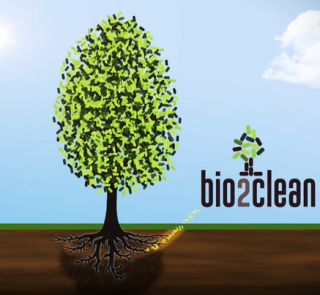
A sustainable innovation story "Using nature to restore itself" (AIM2Flourish)
27/12/2022
A sustainable innovation story for the global learning initiative AIM2Flourish, based on an appreciative research interview with Dirk Dubin, the founder of bio2clean written by Lore Pieters, Jinte Peeters, Mirthe Janowski and Xavier Van Hemelen (UHasselt) was recently published on the AIM2Flourish website! LinkedIn
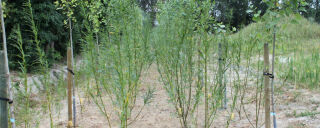
Sustainable Remediation of Soil and Ground Water
10/12/2022
A nice story written by An Voets on how Bio2clean contributes to the UN's SDGs, building on decades of knowledge from UHasselt's Centre for Environmental Studies (CMK) on phytoremediation was recently published on the AIM2Flourish website! AIM2Flourish LinkedIn
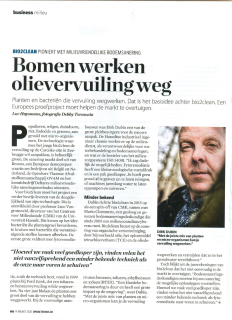
TRENDS 19/03/2020: Trees eliminate oil pollution!
20/04/2020
Trees eliminate oil pollution. Plants and bacteria that eliminate pollution. That is the basic idea behind bio2clean. A European pilot project should help convince the market. Poplars, willows, sea buckthorn, reed, cattail and grasses, supplemented with micro-organisms. The technology applied by the young bio2clean to tackle pollution at the Carcoke site in Zeebrugge is quite green. The remediation is part of RESANAT, a European demo project in which six companies from Belgium and the Netherlands, the Public Waste Agency of Flanders (OVAM) and the knowledge company Deltares are testing environmentally friendly remediation methods. For bio2clean, the project must provide further proof of the quality of its technology. It was developed by Professor Jaco Vangronsveld, director of the Centre for Environmental Studies (CMK) at Hasselt University. He came up with the idea of crossbreeding bacteria that promote plant growth with bacteria that can break down pollutants. The first major field test with phytoremediation, as the technique is called, took place in 1999 at Ford Genk, which wanted to eliminate toluene and benzene pollution. After four years, the plants appeared to have eliminated a large part of the pollution. At the former car builder, Dirk Dubin was one of the great promoters of the new approach. The Hasselt industrial engineer in chemistry worked at the environmental department, responsible for water treatment and soil remediation, and was the driving force behind the ISO 14001 environmental care system. "I immediately saw the possibilities. Phytoremediation has a small ecological footprint and is a lot cheaper. You don't have to dig up the soil and have it cleaned, or have machines pump up and purify water for years". "Although we are often much cheaper, many people do not take it for granted to put forward a less well-known technique such as ours. Less known Dubin founded bio2clean in 2015 as a spin-off from CMK, together with Mario Clemmens, a geologist and former soil remediation expert who has been running an environmental consultancy since 2005. Bio2clean focuses on the remediation of organic contaminants, such as oil, the solvent tetrachloroethylene (TCE) and the oil derivatives benzene, toluene, ethyl benzene and xylene (BTEX). "Traditional soil remediation is expensive and has a major impact on the environment", Dubin knows. "With the right mix of plants and micro-organisms you can eliminate the pollution and prevent it from ending up in groundwater.
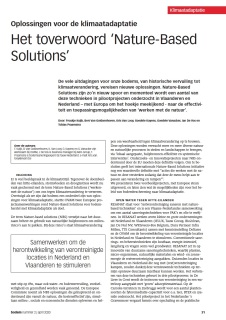
BODEM 2/04/2020: Climate adaptation - The magic word 'Nature-Based Solutions'
10/04/2020
The many challenges facing our soils, from historical pollution to climate change, require new solutions. Nature-Based Solutions are such a new track and a number of these techniques are currently being investigated in pilot projects in Flanders and the Netherlands - with Europe just around the corner - for the effectiveness and application possibilities of 'working with nature'.. ... RESANAT stands for 'remediation of residual pollution using nature-based techniques' and is a Flemish-Dutch collaboration to refine a number of remediation techniques for PAHs and oil. In RESANAT seven small and large companies from the Netherlands and Flanders (iFLUX, Tauw Group, bio2clean, Jan De Nul NV, Witteveen+Bos Belgium, Dura Vermeer Infra Milieu, TTE Consultants) collaborate with knowledge institution Deltares and OVAM to stimulate the redevelopment of polluted sites in the Netherlands and Flanders. ... The LIFE project NARMENA ('Nature-based Remediation of Metal pollutants in Nature Areas to increase water storage capacity') deals with the approach to the remediation of water soils. For this purpose OVAM wants to develop and implement nature-based remediation methods that are both cost-effective and non-invasive in watercourses, riverbank zones and valley soils in Natura 2000, nature reserves and flood plains. OVAM is implementing this project together with the Agency for Nature and Forests and Natuurpunt, which owns and manages the nature areas. The Vlaamse Milieumaatschappij, as watercourse manager, is also a partner in this project together with the experts in the field of soil research and remediation ABO NV, bio2clean (phytoremediation) and ARCHE Consulting bvba (ecomodelling). ... read more
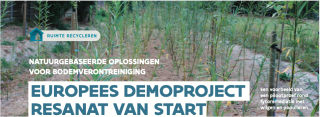
EUROPEAN DEMO PROJECT RESANAT LAUNCHED
29/10/2019
Remediating residual pollution with nature-based techniques, that's what RESANAT stands for. At three locations in Flanders and the Netherlands, nine partners will give their best in this European Interreg project, with the aim of increasing the practical applicability of nature-based techniques and developing codes of good practice.
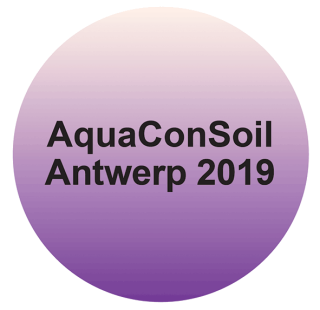
Aquaconsoil Antwerp 2019
17/05/2019
AQUACONSOIL IN ANTWERP HIGHLIGHTS FLEMISH SOIL EXPERTISE. AquaConSoil, the largest European congress in the field of sustainable use and management of soil and water soils is coming to Antwerp! From May 20 to 24, 2019, the Flanders Meeting and Convention Center Antwerp will be the venue for this prestigious congress organized by the Dutch Deltares in cooperation with the Flemish partners, the Flemish Water Knowledge Center (Vlakwa/VITO), OVAM and the Flemish soil remediation sector. The organizers are expecting around 800 soil experts from all over the world during these five days. Bio2clean will also participate in presentations on Thursday, May 23 (CVGP Phytoremediation) and Friday, May 24, 2019 (microorganisms stimulated phytoremediation).
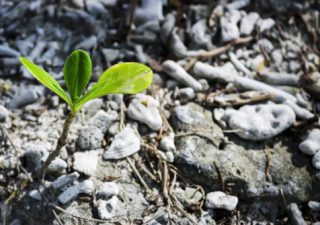
Interreg VL-NL RESANAT approval
10/05/2019
In the Interreg project RESANAT, bio2clean will focus on microorganism stimulated phytoremediation. Follow the details soon on bio2clean.be RESANAT (remediation of residual pollution with nature-based techniques) stimulates the redevelopment of contaminated sites in the Netherlands and Flanders, which is now hampered by the (cost) intensive approach to soil pollution with relatively persistent substances. Conventional remediation and management techniques are expensive, energy-intensive (e.g. excavation or permanent groundwater treatment) and often require long-term, costly management measures for residual contamination. This has a negative effect on the development potential, increases environmental pressure (high water and carbon footprint) and affects the quality of the environment. At present there are no environmentally friendly and economically viable solutions for these locations on the market for landowners, contractors and consultants. A large proportion of them belong to SMEs: 40% for remediation contractors and up to 80% for soil experts. Conventional remediation techniques are often difficult to market due to the unfavourable cost-benefit balance. Innovation is hampered in both countries by the risks associated with experiments, which are difficult for remediation contractors and soil experts to bear. However, knowledge institutes and larger consultancies are innovating in nature-based solutions (NbS), in which plants, micro-organisms, wind etc. energy are used to control residual pollution. In this way, polluted soils can be redeveloped at an earlier stage after conventional remediation of the top layer in combination with less intensive nature-based control of residual pollution. NbS limit the risk to human health and the environment, have lower maintenance costs and are sustainable in terms of energy use. However, these techniques have not yet been sufficiently demonstrated, especially in combination with persistent substances such as PAH, to be used reliably, efficiently and full-scale. At present, many areas remain unused awaiting remediation (e.g. Flemish brownfields) or are subject to long-term management measures with restrictions on use (such as the 2000 NL IBC sites), particularly in urban areas on land which, in terms of location, is very suitable for residential or business development. This aggravates both in NL and VL, where efficient land use is of great importance due to high population density, the pressure on the available open space, a.o. visible in the proclaimed Flemish 'concrete stop'. In addition, the 7th EU environmental action programme states that by 2020 the remediation of the +500,000 contaminated sites in the EU must be in full progress. Before the introduction of the Environment Act in 2021, the Netherlands wants to tackle all urgent remediation sites, while Flanders wants to have remediation started in 2036 at all sites with historical soil contamination. The government, too, is therefore in need of expanding available techniques with more effective and economically viable NbS, focusing on urban land use in VL and NL. The aim of RESANAT is to increase the practical applicability of nature-based remediation, management and monitoring techniques and to develop codes of good practice on these techniques. In this way, the efficient use of natural resources (including land) will be achieved and the deterioration of environmental quality will be limited.
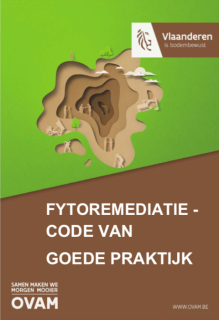
Code of good practice phytoremediation is a fact!
05/02/2019
Together with Arcadis, Witteveen&Bos and UHasselt, bio2clean drew up this Code of Good Practice (CGP) - Phytoremediation. This CGP Phytoremediation has become a voluminous but clear document that provides an overview of the current knowledge about this sustainable, green remediation technology 'Phytoremediation', but also serves as a guide for policy staff and soil remediation experts when weighing up phytoremediation as a relevant technical option for remediating or controlling polluted soils, surface water, groundwater and sediments. Code of good practice – Phytoremediation. Phytoremediation is a remediation technique in which plants are used to extract, degrade or sequester pollutants from soil and groundwater. Plant associated bacteria and mycorrhizas or fungi that live in symbiosis with plant roots often play an important role. In this case, plants improve the growth conditions for the micro-organisms. This remediation technology has numerous advantages: preserving and increasing soil biodiversity and ecosystem services, maintaining soil structure, increasing the overall quality of the living environment and our natural capital. Moreover, phytoremediation is a sustainable remediation technique with usually limited costs for energy, transport and maintenance. OVAM promotes the use of phytoremediation as a remediation technique as part of its policy on soil care, sustainable soil remediation and climate change. The code of good practice provides guidelines for the implementation of soil remediation by phytoremediation. The code includes a detailed description of the technique explaining the different forms of phytoremediation: phytostabilisation, phyto-extraction, phytovolatilisation, phytodegradation, rhizodegradation and phytohydraulics. Next, procedures are included for the feasibility study, for the design, layout, management and monitoring and for the discontinuation and aftercare of a project.

bio2clean organises symposium: "Phytoremediation - A green remediation strategy" on Monday 23 May 2016 in Kortrijk.
23/05/2016
This symposium (half day) is the ideal opportunity to: - NETWORK with colleagues; - find out more about this inexpensive REMEDIATION TECHNIQUE for the removal and/or control of soil and groundwater contaminants with the assistance of PLANTS AND their ASSOCIATED MICRO-ORGANISMS; - find out more about the possible link with the ECOSYSTEM SERVICES, including information on site management, landscaping, biodiversity on company sites, ... Hours recognized as additional training for environmental coordinators and EIA experts in the discipline Soil ! An organisation of bio2clean and CMK (UHasselt)
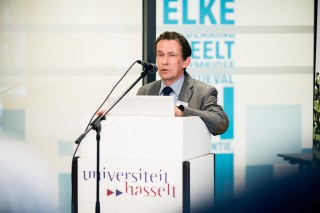
New UHasselt spin-off bio2clean
21/10/2015
After all, soil remediation is extremely expensive. Only 2,700 of the 12,500 Flemish polluted sites have been remediated. The market is crying out for a greener and more affordable alternative. And that is exactly where UHasselt's expertise can make a difference, because the Centre for Environmental Sciences (CMK) has built up years of experience with the greener and cheaper technique of phytoremediation. With the Limburg - West Flemish spin-off bio2clean, the university wants to bring that knowledge - in the form of consulting, project management and training - to the market.
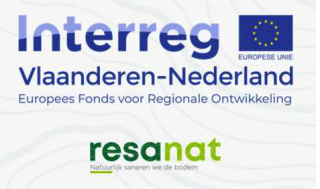
European Interreg project Resanat showcase for nature-based remediation techniques
In the European Interreg project RESANAT, a Flemish-Dutch consortium led by OVAM has been testing nature-based remediation techniques since 2019. At a stakeholder meeting yesterday in Antwerp, the results of the various tests were explained. Using nature-based remediation techniques can be a useful addition to the often costly and intensive conventional remediation techniques, it turned out. ...The third and final project involved phytoremediation at the Carcoke site in Zeebrugge, where bio2clean was working. Dirk Dubin (bio2clean): "For the phytoremediation project, both the feasibility study and the monitoring of the project show that PAH-degrading microorganisms are present and able to metabolize naphthalene and this both on the Carcoke site and on the phytopiles. This project further teaches us what monitoring techniques are appropriate for this type of contamination to demonstrate the effect of phytoremediation, specifically the investigation of microorganisms and degradation products as well as monitoring of groundwater and mass fluxes (iFLUX)."... Read more here >> https://lnkd.in/exmEAYUN
